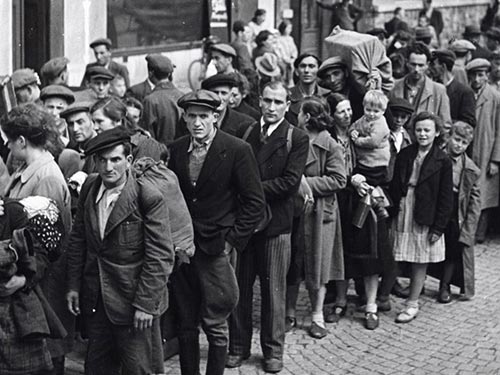History of JDC
1940s : After the Holocaust—Rebuilding Jewish Lives and Jewish Life
As the war in Europe drew to a close, JDC marshaled its forces to meet a crisis of staggering proportions, racing to ensure that tens of thousands of newly liberated Jews would survive to enjoy the fruits of freedom. A massive purchasing and shipping program was instituted to provide urgent necessities for these Holocaust survivors in the face of critical local shortages, with 227 million pounds of supplies shipped to Europe from U.S. ports.
By late 1945, some 75,000 Jewish survivors of the Nazi horrors had crowded into the displaced-persons (DP) camps that were hastily set up in Germany, Austria, and Italy. Conditions were abominable, with many subjected to anti-Semitism and hostile treatment. Earl Harrison, dean of the University of Pennsylvania Law School, asked Joseph Schwartz, JDC’s European director, to accompany him on his official tour of the camps. His landmark report called for separate Jewish camps and for UNRRA (United Nations Relief and Rehabilitation Administration) participation in administering them—with JDC’s help.
To provide that help, Schwartz virtually re-created JDC, putting together a field organization that covered Europe and later North Africa and designing an operational strategy that valued action and initiative.
Supplementing the relief supplied by the army, by UNRRA, and by UNRRA’s successor agency—the International Refugee Organization—JDC distributed supplies that nourished both body and soul: food, medicine, clothing, tools, equipment such as typewriters, and educational, cultural, and religious materials, including books, Torah scrolls, ritual articles, and holiday provisions. JDC funds supported medical facilities, schools, synagogues, and cultural activities, while JDC personnel helped organize communal life in many camps and other installations and represented the DPs before the military and other authorities.
Over the next two years, the number of Jews in the DP camps more than tripled, with a new influx of refugees from Romania, Hungary, and Poland who had been helped to reach Western occupation zones. They included many of the Polish Jews who had returned from their wartime refuge in the Soviet Union, only to flee once again (westward, this time, through Czechoslovakia) in the face of renewed anti-Semitism and the July 1946 Kielce pogrom.
At the same time, JDC was helping sustain tens of thousands of Jews who remained in Eastern Europe, as well as thousands of others living in the West outside the DP camps, in communities whose fledgling reconstruction efforts were soon fostered by JDC with funding from the Conference on Jewish Material Claims against Germany (Claims Conference). In 1946, some 120,000 Jews in Hungary, 65,000 in Poland, and over half of Romania’s 380,000 Jews depended on JDC for food and other basic needs.
By 1947, JDC was supporting 380 medical facilities across the continent, and some 137,000 Jewish children were receiving some form of JDC aid: nutritious food, medical care, educational programs, and health-building recreational opportunities. [Falling victim to Cold War tensions, JDC was expelled from Romania, Poland, and Bulgaria in 1949, from Czechoslovakia in 1950, and from Hungary in 1953; it was able to return to work in these countries at various points in the ensuing decades.]
When the time came to shift from emergency relief to long-term rehabilitation, JDC set up loan institutions, producers’ cooperatives, and work projects across the continent, as well as vocational training and hachsharah (training) centers, which provided agricultural and other training for those seeking new lives in the Jewish homeland. JDC also provided personal counseling and established a tracing service and a vast emigration program for survivors, the majority of whom subsequently resettled in Palestine—and later, Israel.
Realizing that the Jewish refugee problem would be solved only by so-called illegal immigration to Palestine, Schwartz actively supported the activities of the Bricha and Aliyah Bet. His opinion ultimately prevailed at New York headquarters, and in a departure from established policy, JDC provided funding and supplies for these activities and intervened with Washington and the army on issues of borders and refugee quotas. And when the British began interning illegal Jewish immigrants in detention camps on Cyprus, JDC was there to furnish medical, educational, and social services for the detainees.
